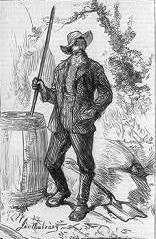 Kentucky moonshiner depicted in Harper's Weekly | |
| Regions with significant populations | |
|---|---|
| Appalachia | |
| Related ethnic groups | |
| White Southerners, Poor White |
Mountain whites were usually poor whites living in the Southern United States in Pre-Civil War America. They were generally small farmers, who inhabited the valleys of the Appalachian range from western Virginia to northern Georgia and Alabama.[1]
History
They were often isolated from the rest of Southern society and civilization. Because of this, they did not own slaves and were likelier to be critical of slavery. As independent small farmers living on the harsh frontier, their interests were starkly different from those of white Southerners that lived on commercial plantations or in large cities. They were also able to retain many of their customs they brought over from Europe that had long since died out in Europe.
Not only were they generally critical of slavery, but they also despised the aristocratic structure of the Deep South, where rich slave-owning planters controlled legislatures and stood as cultural heroes and figures for most southerners.
During the Civil War, some communities of mountain whites were deeply split by those who identified with the Union and those who identified with the Confederacy. Pro-Union attitudes were likelier to prevail among mountain whites in a few states like Virginia, where this sentiment was seen as one of the leading causes of the West Virginia's secession from the rest of the state.
Mountain whites also developed their own styles of music which borrowed from Scottish and Irish tradition as many were of Scots-Irish descent. The music of mountain whites contributed heavily to the formation of bluegrass music.
Identity
People classified as "Mountain whites" during the time of the antebellum South were noted for their impoverished conditions. They put cultural importance on folk magic, old European folk songs, and their unique dialect. They were also noted for their hard-working women compared to shiftless men.[2]
See also
- American ethnicity
- Hillbilly
- Melungeon
- Overmountain Men
- Poor White
- Social and economic stratification in Appalachia
- Tuckahoe and Cohee
References
- ^ Kennedy, David M., Lizabeth Cohen, and Thomas Andrew Bailey. The American pageant: a history of the Republic. 13th ed. Boston: Houghton Mifflin Co., 2006. Print.
- ^ Klotter, James C. (1980). "The Black South and White Appalachia". The Journal of American History. 66 (4): 832–849. doi:10.2307/1887639. JSTOR 1887639.